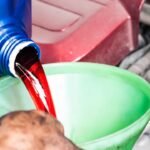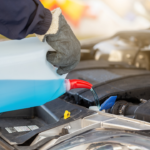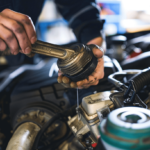Summer is a time for road trips, adventures, and making memories. However, the hot weather can cause some serious issues for your car’s fuel and gasoline usage. It’s important to pay extra attention to how you’re fueling your car during these months to avoid any potential damage or issues down the road.
In this article, we’ll be discussing the top five most common summer car fuel and gasoline mistakes to avoid. One of the main reasons why proper fuel and gasoline usage is so important during the summer months is because the heat can cause your car’s gasoline to evaporate at a faster rate than usual.
This can lead to decreased fuel efficiency and potential engine damage if not handled properly. Additionally, filling up with contaminated gasoline or using the wrong type of fuel can also cause significant issues for your car.
By being aware of these common mistakes and taking steps to avoid them, you can keep your car running smoothly all summer long. So buckle up and let’s dive in! The Top 5 Most Common Summer Car Fuel and Gasoline Mistakes to Avoid
Table of Contents
Mistake #1: Ignoring your car’s recommended fuel type
How using the wrong fuel can be a costly mistake
One common mistake that many drivers make during the summer months is ignoring their car’s recommended fuel type. Using the wrong fuel can cause significant damage to your engine, resulting in costly repairs and decreased performance.
For example, if your car requires premium gasoline but you fill it up with regular unleaded gas, you run the risk of damaging your engine over time. It’s important to always use the recommended fuel type for your specific make and model of car.
Not sure what type of fuel your car requires? Check your owner’s manual or look for a sticker on the inside of your gas cap door.
If you’re still unsure, ask a professional mechanic or contact the manufacturer directly for guidance. Taking this extra step can save you from a lot of headaches down the road.
Tips for determining your car’s recommended fuel type
Determining your car’s recommended fuel type is not as complicated as it may seem. As mentioned earlier, check your owner’s manual or look for a sticker on the inside of the gas cap door.
Some newer cars even have digital displays that show which type of gasoline should be used. For older models, you can use online resources such as fueleconomy.gov to look up this information.
If in doubt, always consult with a trusted mechanic or contact the manufacturer directly for guidance on what type of gasoline should be used in your vehicle. Don’t take any chances when it comes to using proper fuels – it could end up being an expensive mistake!
Timing is Everything: Avoid Filling Up During Peak Hours
When you’re on the go during the summer months, it’s tempting to fill up your gas tank whenever you have a chance. However, there are certain times of day when you should avoid filling up to ensure that your gasoline is clean and free from contaminants. Filling up during peak hours can lead to gasoline that has been contaminated with dirt and other sediment from the bottom of underground storage tanks.
When fuel is pumped rapidly, these contaminants get stirred up and mixed into the gasoline. To avoid filling up during peak hours, try to plan your gas fill-ups in advance.
Consider filling up early in the morning or late at night when fewer people are on the road. This will not only help you avoid contaminated gasoline but also save you time by avoiding long lines at gas stations.
If you do need to fill up during peak hours, make sure to choose a reputable gas station with newer equipment that has proper filtration systems in place. These stations are more likely to have cleaner gasoline since their filters are designed to catch contaminants before they reach your car’s gas tank.
Mistake #3: Overfilling your gas tank
The Dangers of Overfilling
Overfilling your gas tank may seem like a harmless mistake, but it can actually have serious consequences for your car’s emissions system. When you overfill your tank, the excess gasoline can travel into the charcoal canister, which is responsible for collecting and storing fuel vapors from the fuel tank. If too much gasoline enters the charcoal canister, it can saturate the charcoal and cause it to fail.
This can lead to increased emissions and potentially even an illuminated “check engine” light. In addition to damaging your car’s emissions system, overfilling your gas tank can also lead to gasoline spills.
Spilled gasoline not only wastes fuel, but it can also create a hazardous situation if ignited by a spark or flame. Therefore, it’s important to avoid overfilling your gas tank at all costs.
Tips for Avoiding Overfilling
One of the easiest ways to avoid overfilling your gas tank is simply to pay attention while filling up. Most gas pumps have an automatic shut-off valve that will stop fuel flow when the tank is full.
However, this valve isn’t always accurate and may not stop fuel flow in time if you’re not paying attention. Another tip is to avoid “topping off” your tank after the automatic shut-off valve has stopped fuel flow.
This extra bit of gasoline may seem insignificant, but it can actually contribute to overfilling and potential damage to your car’s emissions system. Be sure to check the owner’s manual or consult with a mechanic if you’re unsure about how much fuel your car’s tank can safely hold.
Different cars have different maximum capacities, and filling beyond this point is asking for trouble. By following these tips and avoiding overfilling your gas tank, you can help ensure that your car’s emissions system stays healthy and functional.
Neglecting to Check Tire Pressure
The Importance of Proper Tire Pressure in the Summer
When it comes to summer driving, it’s important not to neglect your tires. One of the most common mistakes drivers make is failing to regularly check their tire pressure.
Not only can underinflated tires lead to decreased fuel efficiency, but they can also pose a serious safety hazard on the road. Driving on underinflated tires can cause them to wear down unevenly and more quickly than properly inflated ones.
This not only decreases their lifespan but also decreases your car’s fuel efficiency. Additionally, underinflated tires have less grip on the road which increases stopping distance and decreases vehicle handling, especially in emergency situations.
How to Check Your Car’s Tire Pressure
To avoid these issues, it’s vital that you regularly check your car’s tire pressure throughout the summer months. The first step is determining the correct air pressure for your particular car (information usually found in your owner’s manual or inside driver-side door jamb).
Once you know this information, you’ll need a tire gauge and an air pump (you can find these at most gas stations). First, remove the valve cap from each tire and insert the gauge into the valve stem.
The gauge should give you a reading of how much air is currently in the tire. Compare this reading with what is recommended for your specific vehicle – if there’s too little air according to this measurement then add air until proper inflation levels are reached.
Repeat for all 4 wheels! Now that you know how easy it is (and why it’s important) there’s no reason not to make regular low-pressure checks part of your summer driving routine!
Beating the Heat: How to Keep Your Car Cool During Hot Summer Days
Summer heat can be brutal, not just for you, but for your car as well. When left parked in direct sunlight for extended periods of time, the temperature inside your vehicle can climb to dangerous levels. This is particularly concerning when it comes to your car’s fuel and gasoline system.
Excessive heat can cause gasoline to evaporate, leading to decreased fuel efficiency and potential engine damage. So what can you do to keep your car cool during hot summer days?
Start by choosing a shady parking spot whenever possible. If you’re unable to find a shaded area and must park in direct sunlight, consider using a windshield sunshade or window visors.
These inexpensive accessories can help block out some of the sun’s rays and keep the interior of your car cooler. Another option is tinting your windows.
Not only does window tinting provide privacy and reduce glare, but it can also help keep the interior of your car up to 60% cooler on hot days. Just be sure to check local laws regarding window tinting before making any modifications.
Fueling Up in the Summer: Avoid These Common Mistakes
When it comes to summer driving, there are several fuel and gasoline mistakes that many drivers make without even realizing it. One of the most common mistakes is neglecting to check tire pressure regularly.
Underinflated tires not only decrease fuel efficiency but also pose potential safety hazards on the road. Another mistake is filling up during peak hours at gas stations.
As gas prices rise during peak hours, drivers tend to flock to gas stations causing an increase in traffic and long wait times at pumps. This congestion increases chances of contaminated gasoline being pumped into vehicles which could lead severe engine damage.
Leaving your car parked in direct sunlight for extended periods of time can also lead significant damage resulting from excessive heat. Gasoline can evaporate and air conditioning units and other components of your vehicle’s fuel system can be damaged.
By addressing these common fuel and gasoline mistakes, you can help ensure that your car runs smoothly throughout the summer months. So be sure to check your tire pressure regularly, avoid filling up during peak hours, and keep your car cool during hot summer days.
Conclusion:
Summer is a time for fun and adventure, but it’s important to remember that your car needs proper care and attention. By avoiding the most common fuel and gasoline mistakes, you can ensure that your vehicle runs smoothly and efficiently all season long. Remember to check your car’s recommended fuel type, avoid filling up during peak hours, be careful not to overfill the gas tank, keep an eye on tire pressure, and find ways to keep your car cool during hot days.
By following these simple tips and tricks, you can save money on gas expenses while driving safely on the road. Taking good care of your car during the summer months can also prevent potential auto accidents caused by improper maintenance or negligence.
Remember to stay vigilant about fuel efficiency and gasoline usage – not only does this help protect our environment but it also saves us money in the long run. Make sure you’re using the right type of fuel for your vehicle as recommended by the manufacturer.
Avoid busy hours at gas stations if possible so that you don’t end up with contaminated gasoline. Don’t overfill the tank; instead fill it up just enough so that you don’t have to worry about spills or damage to your emissions system.
Make sure to check tire pressure regularly; underinflated tires not only waste fuel but can also be dangerous on the road. With these simple steps in mind, we hope you’ll have a safe and enjoyable summer driving season!






